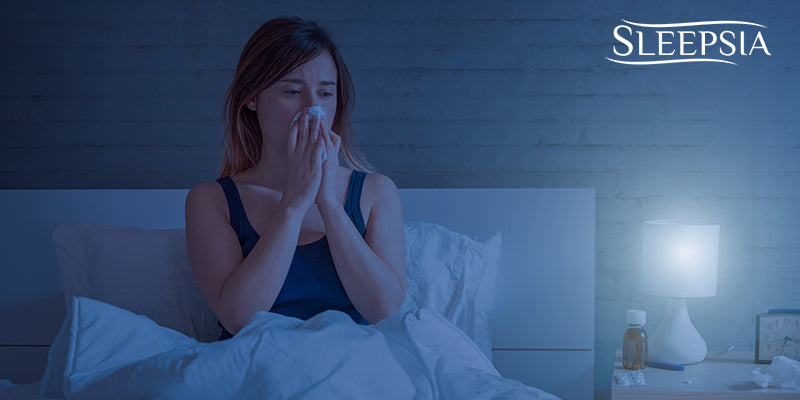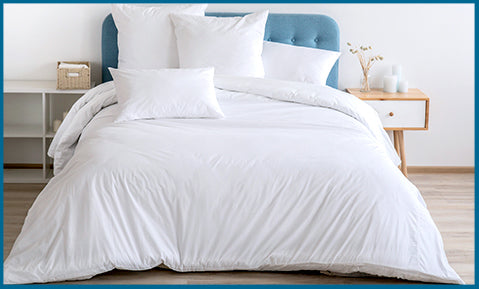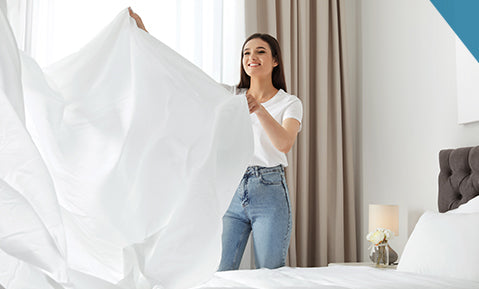
Our sleep naturally prepares our mind and body for the challenges due the next day. Would you agree? Yes, I guessed so!
A night of proper sleep can relieve us from stress and keeps us in a positive frame of mind. With a positive mind and rejuvenated mental health at our disposal, we are better equipped to fight the challenges thrown in by life. But, if you have ‘crossed path’ with allergies, you would know how challenging sleep can be at times, especially during the nights. Believe me, you are just one of those millions of people who suffer from sleep issues caused by allergies.
We are here to help you out. Please go through this blog. We will discuss some important strategies, using which you can stop allergies coming in between you and your sleep.
Here we go!
‘Mind’ your pillows

You may not have realized it; but, your old pillow can be a reason why you have developed allergies. It may have been a repository of dust, body oils, skin cells, and sweat trapped inside, and these can contribute to allergies. The situation may get even worse if your pillow has become ‘older. This is why experts advise us to change pillows once every 6 months.
If you don’t want to replace your pillow too frequently, you may consider introducing bamboo memory foam pillows to your bed. Instead of normal foam, these pillows are filled with viscoelastic foam. This foam is made of a special type of plastic called polyurethane, which you will find in high-quality sofas and mattresses.
It is an innovative pillow with enhanced features and has been quite a craze of late. One important feature is that it can provide you hypoallergenic support. While you sleep, it keeps the allergens away from your bed.

Watch out for dust mites
It’s normal for dust mites to lurk in your bedroom. They can further disrupt a downy sleep. To maintain a barrier with them, use dust-mite-proof mattresses and pillows. Wash the bedding with hot water at least once a week to kill the mites and other allergens. Dust mites can also gather in carpets and curtains.
Therefore, you would do well to remove fabric curtains from your bedroom. Instead of carpets, you can resort to hardwood floors. Also, use an AC or a dehumidifier to keep the humidity below 50 percent. This is because; dust mites relish a humid and warm home. A cool-mist humidifier in the bedroom
Keep your pets out of the bed
Your family pet can be a big allergy offender. They can be a carrier of dust mites, pollen, and mold into your bedroom. Keep them out of your bed or even of your bedroom. This is particularly important if they spend time outdoors.
Try changing your sleeping position

Your troubles with sleep during the ‘allergy season’ may also be due to your improper sleeping position. By ‘tweaking’ your preferred sleeping position a bit, you can reduce sinus pain and a fare up. Try tucking one or two pillows under your head and upper back so as to sleep in an upright position. This will help you drain your throat and nose of congestion with minimum effort.
Change your medication routine
Many allergic symptoms such as itchy eyes, running nose, and sneezing often find their peak in the early morning, mostly after you wake up. These symptoms can be reduced significantly if you switch to having your anti-allergic medicines at night (before you hit the bed).
It will make sure they circulate into your blood well before the allergens come to their peak early in the morning. However, before making any such change, we would advise you to speak to your allergist first.
Eliminate Pollen

Pollen is a primary allergy culprit. Don’t forget to check pollen counts while planning some outdoor activities. It will help you restrict outdoor activities during the time when the pollen and mold counts are on the higher side. You may plan outdoor activities after rain as the pollen count is comparatively low during this time.
If possible, keep the outside doors and windows in your house shut during the daytime in the peak pollen season.
Also, if you come home after a stay outdoors during the peak pollen season, make sure to change your clothes before you come to the bedroom. If you come to the bedroom with these clothes, the pollen can accompany you to your bed and may affect your sleep during the night. Leave these clothes elsewhere (preferably in the laundry room). Also, don’t leave them to dry outside.
- Use a dryer instead. Having a shower at night and washing your hair is another smart move during the peak pollen season.
- Use baby wipes to wipe your eyelids and rinse your eyes and nose with saline water. This is to ensure you won’t sleep with pollen in the most vulnerable areas of your body.
Like all bad things in life, the allergy season also does not last for long. But, while it is there, it can be no less than a bad dream. We have discussed some innovative strategies above to help you keep allergies at bay and enjoy a night of better sleep.
Hope, you ‘apply’ these tips in your life, and soon those potential ‘sleep spoilers’ (such as stuffy nose, sore throat, watery eyes, and so on) will be a thing of the past for you.
NEWS:
US FDA to Investigate the Issue of Allergic Reactions in COVID-19 Vaccine
The US FDA recently said that it has started working with Pfizer after it was reported that some recipients of the Pfizer-BioNTech COVID-19 vaccine have developed allergic reactions. It has also said that the US authorities, including the Centers for Disease Control and Prevention, were investigating those cases and working with Britain to better understand two similar cases that occurred there.












